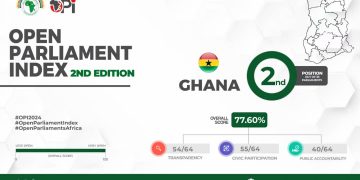BudgIT Ghana Calls for Deeper Reforms Following 2024 Open Parliament Index Release
BudgIT, a prominent civic tech organisation promoting transparency and accountability in
Ghana’s public finance, has commended the release of the 2024 Africa Open Parliament Index (OPI) by Parliamentary Network Africa (PNA) and the Africa Parliamentary Monitoring Organisations Network (APMON), a vital benchmarking tool that provides empirical insights into the openness, responsiveness, and accountability of African parliaments.
For Ghana, the 2024 ranking offers both recognition and reflection—a testament to institutional progress and a call for deeper reform.
The Index provides not only a comparative overview of legislative performance across the continent but also illuminates how well African parliaments are bridging the gap between citizens and governance.
For Ghana, the findings signal commendable growth in transparency and institutional modernisation while revealing enduring challenges in civic participation and accountability.
In the latest ranking, Ghana attained a score of 77.60%, ranking second in Africa out of 33 parliaments—just behind South Africa and ahead of Kenya. This marks a remarkable improvement from the 2022 score of 63.03%, when Ghana placed first among 13 assessed parliaments.
The progress is evident in enhanced legislative transparency, expanded digital access, and improved institutional visibility, which have collectively strengthened citizens’ access to parliamentary information.
Yet, the 2024 sub-scores—Transparency (54), Civic Participation (55), and Accountability (40)—indicate that while transparency and access have improved, citizen engagement and oversight mechanisms still lag. The test of genuine openness lies not only in the availability of information but also in how effectively it empowers citizens and drives responsive governance.
Commenting, Jennifer A. Moffatt, Country Lead at BudgIT Ghana, stressed that Ghana’s latest ranking offers both recognition and responsibility, reflecting the nation’s progress while highlighting areas that demand sustained reform.
“Ghana’s performance in the 2024 Open Parliament Index is both a commendation and a challenge. It reflects steady progress in transparency, yet underscores the urgent need to deepen accountability and citizen participation. True openness goes beyond access to information; it is about empowering citizens to shape governance and demand results actively.” Jennifer said.
Despite the positive trajectory, Ghana’s strong institutional frameworks, characterised by public access to legislative papers, committee reports, and digital platforms, still fall short of achieving full accessibility and participation. The OPI findings highlight a gap between formal transparency and functional engagement, as information is not always easy to navigate or act upon, particularly for rural and marginalised communities.
Similarly, while digital disclosure has improved, the limited frequency of public hearings and fragmented feedback systems suggest that citizens often remain observers rather than participants in legislative processes. The index further underscores the lack of institutional follow-through, showing that transparency is meaningful only when it triggers reform and accountability.
At the same time, Ghana’s overall performance reaffirms its leadership in parliamentary openness across West Africa, and it also emphasises the need for reform that is both deeper and more sustainable. Transparency gains must be anchored in institutional safeguards, parliamentary norms, and consistent political will to ensure resilience against future regression.
For civil society organisations, journalists, and citizens, the OPI serves as a crucial accountability tool that should stimulate public discourse and constructive engagement, rather than merely existing as a published metric.
BudgIT Ghana believes that the next phase of parliamentary reform must move beyond compliance to embed openness within the very fabric of legislative practice.
This entails institutionalising citizen participation in legislative drafting, strengthening feedback and response systems such as the Citizens’ Bureau, simplifying and localising data for wider accessibility, and embedding transparency protocols in parliamentary standing orders and budget frameworks.
It also requires sustained capacity building for citizens, MPs, and parliamentary staff to foster informed participation and inclusive oversight.
Ultimately, the 2024 OPI results stand as a testament to Ghana’s decades-long journey of civic advocacy and institutional reform. Yet, they are also a reminder that transparency is only the foundation of democracy; accountability and participation complete it.
Ghana must now advance from an open parliament by design to an open parliament by practice—one that is genuinely participatory, people-centred, and fully responsive to citizens.
To this end, we reaffirm our commitment to working with Parliament, civil society, and citizens to translate these benchmarks into tangible democratic outcomes, ensuring that openness evolves from principle to practice in Ghana’s governance landscape.








